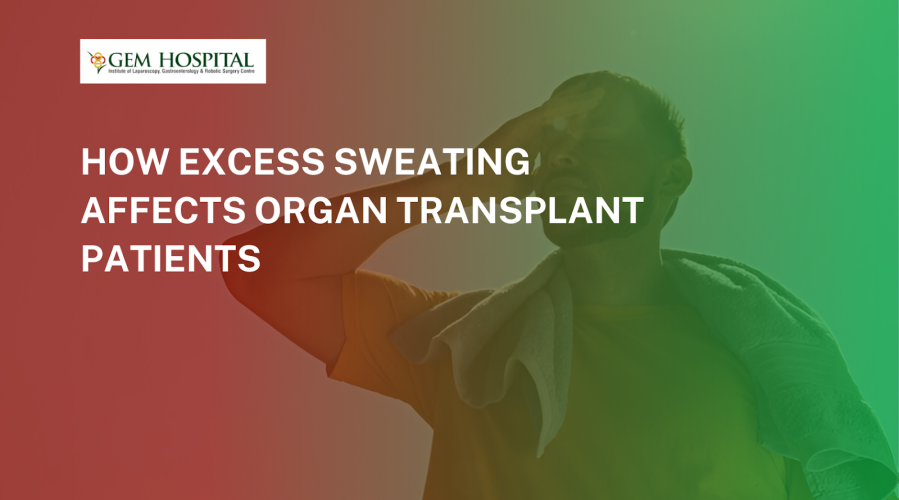Consult experienced hernia doctors in Chennai for expert surgical care. Advanced diagnosis, safe hernia surgery, and faster recovery with specialized treatment.
How Excess Sweating Affects Organ Transplant Patients

Organ transplantation saves lives, but the pathway does not stop with the surgery. Post-transplant, patients may have a lot of physical changes in their bodies from medications, immune changes and changes to their lifestyle. An often neglected but important but when dealt with an unsatisfactory is the sweating. Though sweating is a normal mechanism for maintaining proper internal temperature, the situation can be more than a nuisance in the case of transplant recipients—potentially signaling serious underlying problems, causing complications that interfere with recovery, and negatively impacting overall quality of life.
Understanding the Connection:
Excess sweating in organ transplant patients can be triggered by multiple factors. The most likely suspect is immunosuppressant drugs, and certain of these drugs (such as cyclosporine and tacrolimus) are known to disrupt temperature regulation and nerve function in the body. Infections and metabolic imbalances Infections and metabolic imbalances can also exacerbate sweating episodes.
Patients may also be more susceptible to night sweats which can affect sleep quality and weaken the immune system. This persistent moisture can put the skin at risk of developing fungal or bacterial skin infections — especially in patients whose immune systems have already been compromised. Additionally, if not treated early, it can result in electrolyte disturbances, fatigue and dehydration.
Potential Complications of Excess Sweating
- Skin infections: Constant moisture makes the skin a breeding ground for bacteria and fungi.
- Dehydration: Excess fluid loss through sweat can deplete the body, especially in warmer climates.
- Electrolyte imbalance: Loss of sodium and potassium can lead to muscle cramps, weakness, and confusion.
- Psychological impact: Sweating can cause embarrassment and affect social interactions, impacting mental health.
- Sleep disturbances: Night sweats can cause discomfort, sleep loss, and fatigue.
How to Manage It
Organ transplant patients are advised to keep a record of their symptoms, including how often it happens, what makes it worse and how heavy the sweating is, the doctors said. This is useful for recognizing trends and tweaking medications when needed. Good hygiene, wearing loose clothes and keeping cool are all preventative measures against jock itch. Doctors may recommend antiperspirants, medications, or even changes in your daily routine to help you deal with excessive sweating.
While excessive sweating can be a mere minor annoyance for organ transplanted patients, it can have impact on physical quality of life, mental and also contribute to the success of the transplant. Preventive measures should be undertaken early to avoid sequelae. At GEM Hospital, we recognise that transplant patients face a different set of post-operative issues. We are a team of professionals dedicated to each patient, we offer holistic attention, personalized follow-ups and with more in treatments that can mitigate those side effects.
No matter who you are or who you love, if you or someone you know is sweating excessively as a result of organ transplantation, do not ignore it. In organ transplant patients, sweaty conditions may be one way your body’s trying to tell you about some imbalances at a deeper level. We specialize in diagnosing and treating excessive sweating in organ-transplant patients in a patient centered manner. Whether it’s managing medications or taking care of the skin, we cover all of a patient’s post-transplant recovery. You can contact us for personalized advice and these patients for excessive sweating problem and schedule a consultation with us at GEM Hospital to get started on making your post-transplant journey a much easier one.
Blogs & Article
Get advanced liver transplant treatment in Chennai with expert surgeons, modern technology, and comprehensive care for safe and successful outcomes.
Get advanced piles treatment in Erode with expert doctors. Safe procedures, modern technology, and effective care for fast relief and recovery.


